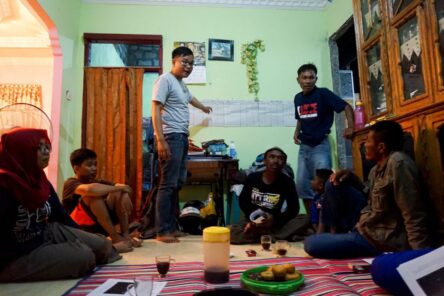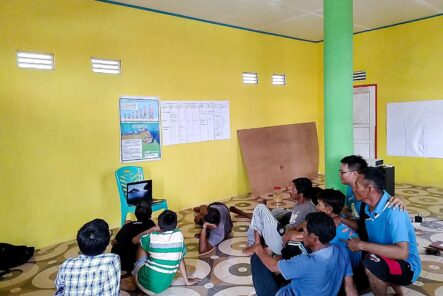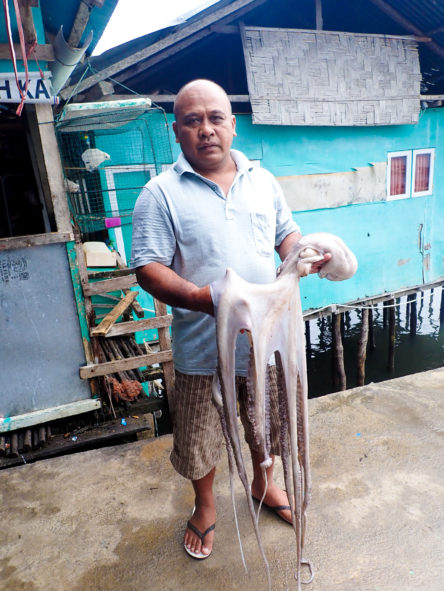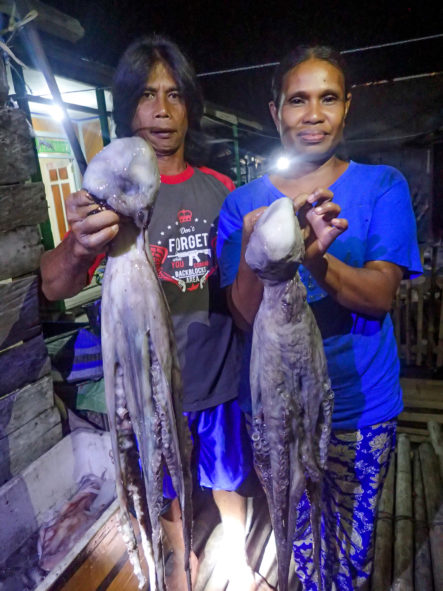This post is also available in:
 Indonesian
Indonesian
In the heart of the Coral Triangle, a community of octopus fishers have been transforming their lives for the better. Previously notorious across the region for their use of destructive fishing practices, the people of Bulutui village in North Minahasa Regency, North Sulawesi Province, Indonesia, have implemented their first periodic octopus fishery closure and developed a new Peraturan Kepala Desa (Village Head Regulation) to regulate how the community manages their fishery.
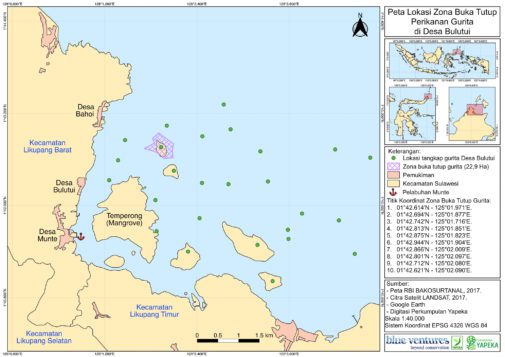
The new closure area, marked in purple | Photo: YAPEKA
The village head, Aswadi Sahari, is also an octopus collector, and so understands the pressing need to manage the village’s fishery. “In January 2020, the Bulutui community decided to close Napo Ila, one of Bulutui’s traditional fishing locations, for octopus fishing activity”, he said. ‘Napo’ refers to areas of the sea that are not submerged during low tide, making them prime spots for octopus fishing. “We’ve named the closure area ‘Rumah Boboca’, which means ‘the home of octopus’. Octopus in this area can only be caught once every three months during a seven-day fishing period.”
Reef octopus have a short life cycle (around 15-18 months) but a rapid growth rate, and are able to almost double in weight every month for the first six months of their life. This is why periodic fishery closures are so effective; the reduced fishing pressure, even just for a short period, means that the octopus are able to dramatically increase in size. Once the area is reopened, fishers can harvest larger octopus which fetch higher prices from seafood buyers. This management method has been hugely successful throughout the Western Indian Ocean, including in Andavadoaka in Madagascar, Quirimbas National Park in Mozambique, and Moheli National Park in the Comoros. The fishers of Bulutui are now following suit, hoping to see similar results in their catch.
The process of engaging an entire community of fishers who have worked with the ocean in the same way for generations is complex and ongoingAs a community that relies so heavily on an abundant octopus catch, tapping into this opportunity to generate higher and more stable incomes simply made sense for the fishers of Bulutui. However, the shift in their attitudes and practices didn’t happen overnight – the process of engaging an entire community of fishers who have worked with the ocean in the same way for generations is complex and ongoing. In Bulutui, it began with a careful process of listening and learning about the history of their octopus fishery.
Community engagement: looking to the past
Bulutui village is a traditional Bajo community, the former seafaring nomads of the Coral Triangle. Now home to around 700 people, the people of Bulutui are highly dependent on the ocean, both for their own survival, but also for their income. Octopus fishing is the primary source of income for almost all of the men in the village, and has been for over 60 years. However, in recent years, fishers have noticed significant changes in their catch.
In the past, a fisher could catch more than 20 octopus in one trip, with the average weight of each octopus at more than two kilograms, and sometimes even up to five kilograms. Nowadays, the size of octopus caught is smaller, and it is also challenging to catch as many octopus as we did before.” Aswadi Sahari – village head in Bulutui
Mostly due to high market demand, a lack of octopus is a growing problem in Bulutui. As a result, unregulated, unsustainable and destructive fishing practices are commonplace, and this means that fish stocks are under even more pressure. The community in Bulutui recognised that depleting fisheries meant that their livelihoods could be at risk – so something had to change.
The fishers of Bulutui started to discuss their fisheries, working out how to provide the octopus with more time and space to grow and spawn without human disturbance. “We wanted to start managing the octopus fishery through periodic closures, so that we can keep seeing octopus here in the future,” Aswadi told YAPEKA, a national NGO, that began working with the fishing community of Bulutui in 2016.
After four years of building strong relationships, gaining credibility and earning trust in Bulutui, YAPEKA saw transformative change amongst the octopus fishers. For example, in 2018 Bulutui fishers started to monitor their octopus catch. YAPEKA helped them establish a catch monitoring system and trained octopus buyers in the village as data collectors – recording catches, fishing locations and gears.
This data has become an empowering tool for the community, enabling them to make more informed decisions about how to manage their octopus fisheryThis data has become an empowering tool for the community, enabling them to make more informed decisions about how to manage their octopus fishery and subsequently establish their first periodic fishery closure, Napo Ila.
For the fishers of Bulutui, the process of looking back at how their fishery had changed over the years and learning about responsible fishing techniques with YAPEKA, empowered them to take proactive steps in managing their resources and sustaining them for the future. Yet, simply establishing a new management system wasn’t going to solve the problem – maintaining community engagement is a vital part of fisheries management and in this case, that meant keeping watch over their new closure area.
Community surveillance: collaborating in the present
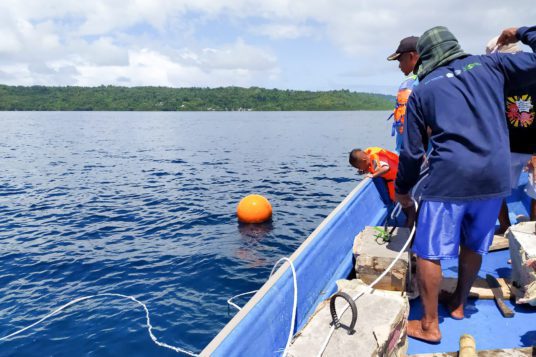
Installing buoy markers around Napo Ila | Photo: YAPEKA
The benefits of periodic fishery closures are clear, but they are only effective if the local fishing community can maintain a certain level of surveillance. In Bulutui, the community are well aware of the importance of protecting Napo Ila, their newly established, 22.9 hectare fishery closure area. On the last day of February 2020, octopus fishers, collectors and members of the Bulutui village government installed buoys around the border of Napo Ila. This is to deter fishers from fishing in the closure area.
“Fishers from Bulutui have agreed to watch the area together,” said Aswadi, “If we witness a violation, the first step is to give a verbal warning to the person who is caught fishing octopus in the area. If they repeat the offence, they will be asked to report to the village head and sign a statement which affirms that the action will not be repeated,” he added.
We hope that fishers are cooperative because even though Napo Ila is closed, they are still able to catch octopus in other locations,” said Aswadi, highlighting that there are a lot of napo surrounding Bulutui.
The community established their own surveillance system and now play an active role in ensuring that their local regulations are followed by other fishers in the area – an inspiring turn around, considering that they were known for unsustainable fishing themselves in the past. Over the past few years, they have shown an ongoing commitment to looking after the health of their oceans and this trend doesn’t seem to be slowing down as they look to the future.
Community education: looking to the future
Following their decision to establish Napo Ila, the community in Bulutui have been continuing to learn about their octopus fisheries. Throughout January 2020, YAPEKA held a series of roadshow activities that sought to engage women, working fishers, and the younger members of the village. During these sessions, they learnt new things about the biology of octopus and had space to continue to discuss the best ways to engage in conservation efforts without damaging local livelihoods.
The increased awareness of the community in Bulutui has empowered them to be more autonomous in managing their natural resources. Whether developing a village regulation to manage the fishery, establishing a monitoring and surveillance mechanism, or starting community discussions about conservation efforts – there is hope for the future of this community. The people of Bulutui can continue to benefit from the ocean’s valuable, nutritious and vital natural resources, as they have done for hundreds of years.
Read more about Bulutui’s journey with YAPEKA in Lugas Hakim’s blog, Breaking stereotypes: the Bulutui community starts to monitor their octopus fishery.


